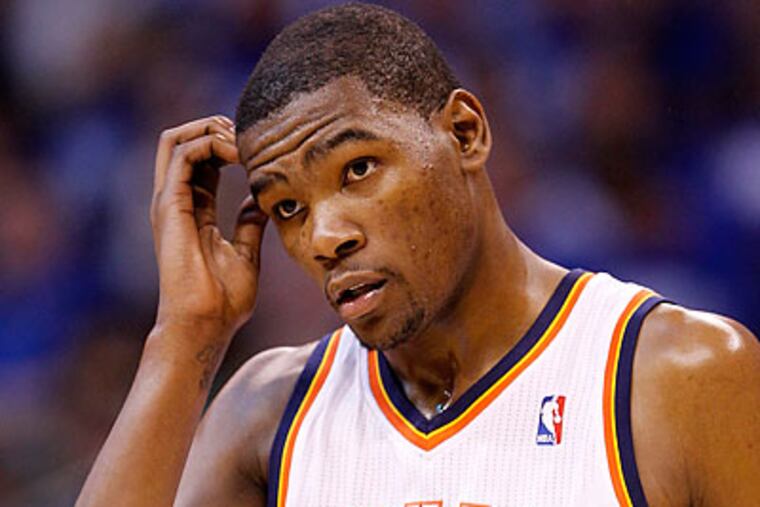In lockout situations, the owners can afford to play ball
I'M SURE THAT at this particularly moment, Oklahoma City Thunder star Kevin Durant believes in his bravado and has confidence in his fellow NBA players.

I'M SURE THAT at this particularly moment, Oklahoma City Thunder star Kevin Durant believes in his bravado and has confidence in his fellow NBA players.
"We're going to stand up for what we have to do, no matter how long it's going to take," Durant said recently about the NBA lockout. "The way the [collective bargaining agreement] worked before is something we really liked. There's no need to change it.
"We're not going to give in. We're going to stick with it until we come out with a good deal."
And that's the biggest hurdle to a resolution to the NBA lockout.
If the judging point for the players is "we really liked" the expired CBA, then they cannot get a "good deal."
Something is going to have to change for the NBA owners to end this lockout. And that something is ultimately going to come out of the players' side of the agreement.
I don't care about the numbers.
You've got multimillionaire players fighting with multibillionaire owners over how to equitably divide billions of dollars in profits.
With the majority of Americans struggling to enjoy the basic necessities of life and maybe have an occasional indulgence, like a family vacation, I couldn't care less who wins this fight. When it is all said and done, the owners are still going to be multibillionaires and the players are still going to be multimillionaires.
Excuse me if I still see that as a win-win situation for both sides.
I try to look at these professional sports labor disputes from a realistic and practical perspective. My position has always been that, if the owners truly have the stones to make the necessary sacrifices, they will always get closer to what they want than what the players want.
It's not that hard to figure out why.
The players, regardless of what their current stature may be, have a limited shelf life. Owners do not.
Players are dependent on the game for their lifestyles to continue at the status quo. While most owners feel they deserve a profitable return on their investments, they generally are not dependent on their sports franchise to continue their lifestyles of the rich if not always famous.
Owners, if they want to, can wait the players out.
That's what the National Hockey League did with the lockout that canceled the 2004-05 season.
If you recall, a lot of hockey players sounded a lot like Durant, insisting they were unified and would not give into the taskmaster demands of the owners. But that was when they thought that the owners would blink, that there was no way they would actually forfeit the season over a labor dispute.
I'm not sure if that was actually the NHL's intent, but once it happened, everything swung into its favor in the negotiations.
The players weren't stupid. It didn't take long for them to realize that the bills didn't stop coming just because their paychecks did.
It didn't take long for it to set in that they had lost an unrecoverable year of their careers in salary and actual playing time.
The owners got their salary cap.
And while the NHL suffered some backlash, it slowly built itself back to a point where it is as healthy as ever and the owners are making as much as they want.
This is the same dynamic that ultimately will play through if the NBA owners are steadfast in their position. When Durant, the Thunder's player representative, said it "might have to take all the way up until maybe December or January," it had to be like music to the owners' ears.
The owners know they can kill an entire season and be OK. They know that despite all of the current hysteria, they can eventually grow the game back.
I doubt that even a single player has seriously contemplated the effects of missing an entire season of their careers.
Most players are not like Durant or LeBron James or Dwight Howard, who will make about $150 million in their careers regardless. For the rank-and-file player whose 5-year career will be shortened to 4 years or for the journeyman who never gets a chance at a mega-contract, the implications of missing an entire season could be devastating.
The bills won't stop coming just because the paycheck isn't.
The owners may not get everything they want, but it is inevitable that things will end up closer to their point of view than the players'.
As soon as the players accept that realization, they'll take a huge step toward getting this dispute resolved.
Send email to
For recent columns, go to